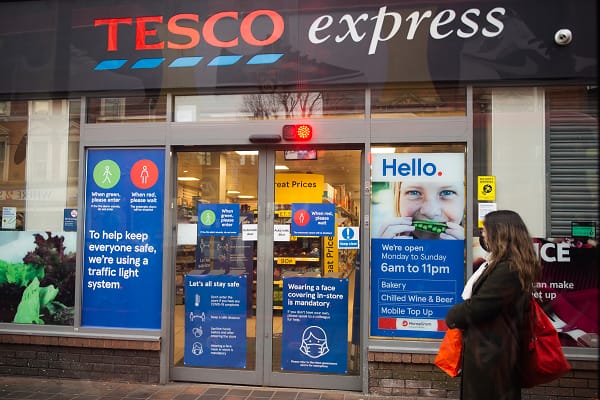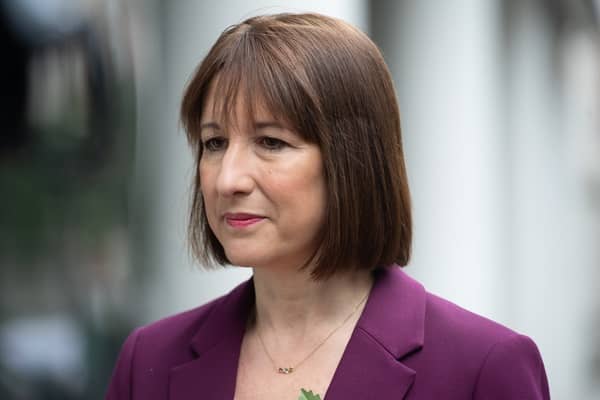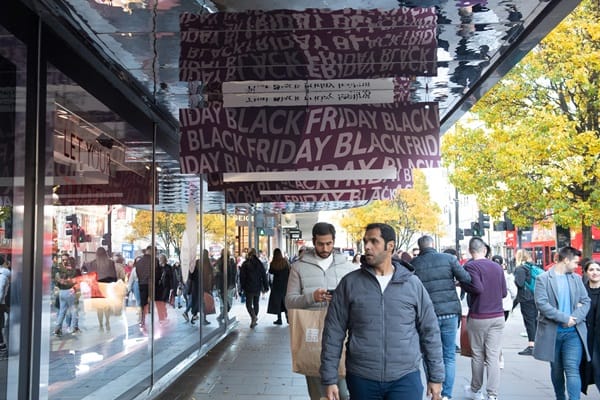Bussiness
Breaking The Glass Ceiling: An Indian First-Generation Student’s Path To London Business School
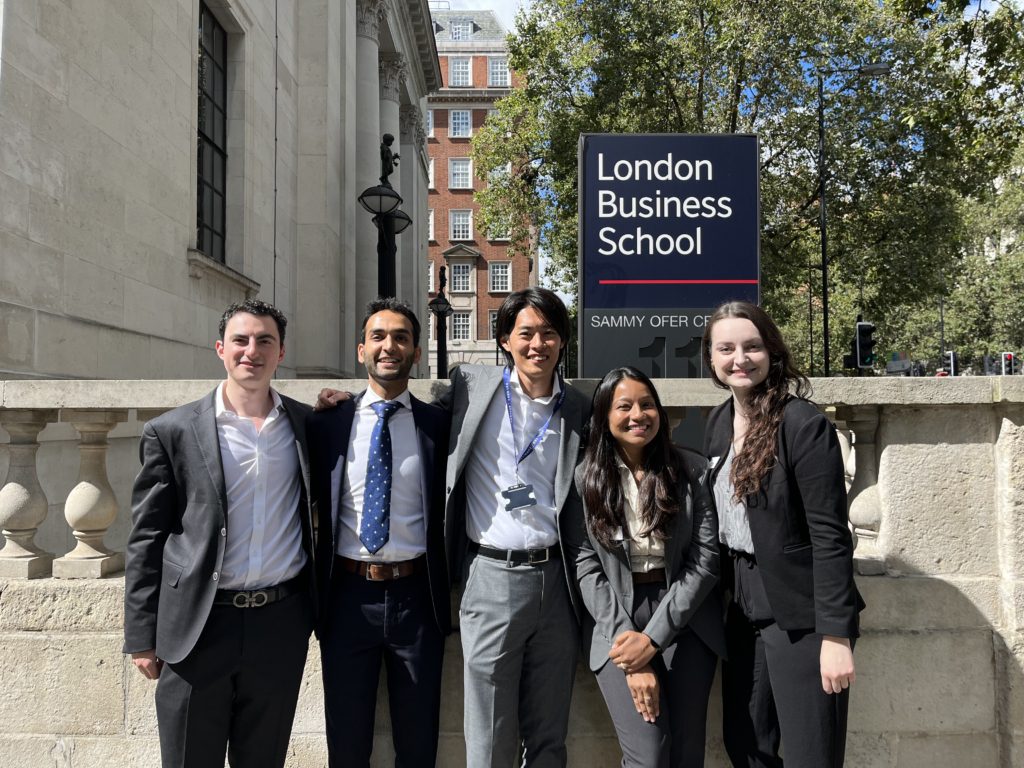
Divya (second from right) with her study group on Day 1 of LBS
Recently, on a flight to India, I sat next to a woman on her second flight ever. She was returning home after visiting her son in London. As we spoke, her pride was palpable—her son, a first-generation student like me, had worked hard to earn his place in the UK and was pursuing an MBA.
While she beamed with pride, her eyes filled with tears as she shared the struggles they endured. Like many first-generation parents, she faced constant financial hardship, lacked access to proper guidance, and was burdened by the overwhelming fear of the unknown. After all, he was the first in the family to break the cycle and create a life abroad. Helping her navigate the all-English in-flight entertainment screen, I started to think about my future. Will my mother feel the same pride when I graduate from London Business School? Will someone be kind enough to help my non-English-speaking mother during her first long flight to London?
As these thoughts swirled in my mind, I couldn’t help but smile at how far I’ve come. If someone had told me years ago that I’d be here — pursuing an MBA at London Business School, leading clubs, advocating for inclusivity, and sharing my story — I might have dismissed it as an impossible dream. But here I am, a first-generation, intermediate-income girl from the heartlands of India, breaking the glass ceiling and defining belonging every step of the way.
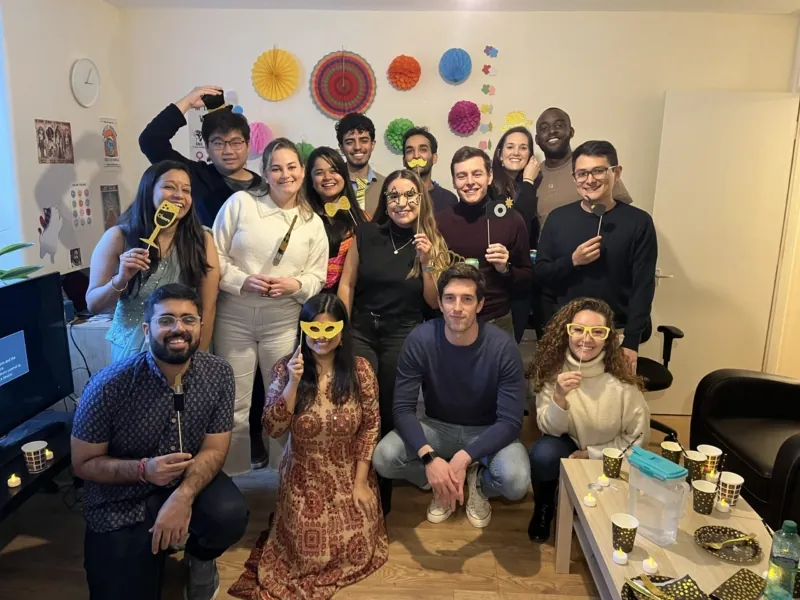
Cultural exchange in the form of a Diwali lunch hosted at Divya’s house
MY LIFE BEFORE LBS…
Growing up in Rewa wasn’t easy, especially being the daughter of a single parent. My incredible mother raised me single-handedly, instilling in me the values of resilience and hard work. While she did everything she could to provide me with a good education, resources were limited. Outside of academics, I was largely unaware of the broader world— with limited access to libraries, the internet, or mentors. But recognizing my potential, my mother sacrificed much to ensure I could attend a good university, even if it meant draining her savings. Through scholarships and financial support, I was able to complete my education.
In 2015, I became the first in my family to graduate as an engineer. At that time, I didn’t even know what GMAT or GRE was. While others prepared for advanced degrees, I was just beginning to learn about these exams. This is what I call the “problem of unknown unknowns”. As FLII (First-Generation Low-and-Intermediate-Income) students, we often face struggles far beyond financial barriers; we confront gaps in knowledge and access. What you don’t know can be a significant roadblock.
Initially, my dream was to become a Nuclear Science Engineer, inspired by the likes of Homi Bhabha and Vikram Sarabhai, hoping to contribute to solving India’s energy problems. However, an internship at the Bhabha Atomic Research Centre introduced me to data analytics. I remember walking into the lab and being flabbergasted at the mention of the word “SQL”, as my previous computer lab experiences had been limited to data entry in Excel. This encounter sparked my love for data, which led me to join MuSigma, an analytics firm in India. Working with data empowered me to back my opinions with concrete evidence, as my peers and mentors valued my intellect and analytical skills over my background. This validation boosted my confidence and fostered a sense of belonging and purpose. My thirst for learning helped me build a career there, eventually leading to a position at Google as an analyst.

Divya (Left) with Lord Laidlaw and Susanna Kemp from Laidlaw Foundation Meet and Greet at LBS
At Google, I was surrounded by people who valued my desire to learn and saw past my limited exposure to the specific dynamics, expectations, and unwritten rules of the corporate world. In addition to work, I became involved in mentoring and building a sense of belonging for people from diverse backgrounds through Employee Resource Groups (ERGs). The mentorship and encouragement I received there helped me dream bigger. While working at Google, I cherished being the least experienced person in meetings, as it allowed me to learn from others. However, during a pivotal moment, I pitched a product insight to the finance, marketing, and business development teams, only to have the finance team reject my proposal due to a “negative NPV.” At that moment, I realized I didn’t understand what “NPV” meant. This experience motivated me to pursue an MBA to grasp the intricacies of business functions and the critical role finance plays in driving success.
AND THEN, LBS HAPPENED…
Deciding to pursue an MBA was a significant step, but choosing LBS was an intentional move. The school’s global perspective, diverse community, and leadership emphasis felt right. With over 60 nationalities represented in my cohort, I knew LBS was a place where I could grow. However, financial concerns loomed large. Luckily, I received the prestigious Laidlaw Scholarship, which recognized my background and potential. This scholarship made attending LBS possible, and I’ll always be grateful for the support.
However, my first month at LBS was overwhelming. I questioned my decision to leave my job and doubted whether I belonged. Many of my peers seemed so well-connected—they had established networks through LinkedIn before arriving, while I didn’t even realize that you could reach out to second-year students for one-on-one chats. Everyone was meeting at clubs, dinner events, or parties, while I was still struggling with my daily expenses. It felt like I had “big dreams but no big pockets.”
That all changed when I met Priyal Keni, the former president of the Student Association (MBA ’24). Like me, she was a Laidlaw Scholar. Her journey was inspiring. Instead of getting stuck in the vicious cycle of trying to fit in, she focused on building community and uplifting campus life, helping to redefine belonging for students from diverse backgrounds. During her tenure as president, she prioritized developing policies that promote equitable opportunities on campus. This included advocating for clubs and communities to offer subsidies for students participating in career treks.
Seeing the impact of her work and with her encouragement, I became Vice President of the FLII (First-Generation, Low and Intermediate Income) Club at LBS. This gave me a platform to make education, opportunities, and events more accessible for all through advocacy for financial support, promoting inclusive policies, and collaborating with other clubs and external organizations to provide additional support and resources to students from FLII backgrounds. As the president of the FLII Club this year, I hope to redefine belonging at LBS for incoming students and increase the visibility for FLII students, as being FLII essentially means having an invisible form of diversity.
Since I assumed the presidency, the club has supported over 50 students from various programs, enabling them to attend career and social events at subsidized costs. Additionally, we have organized numerous career-specific training sessions with external mentors. My ultimate goal for the FLII club is to establish a scholarship specifically for FLII students to support individuals who have the potential to excel in an MBA program (and do big things after graduation), but lack the necessary financial resources and guidance.
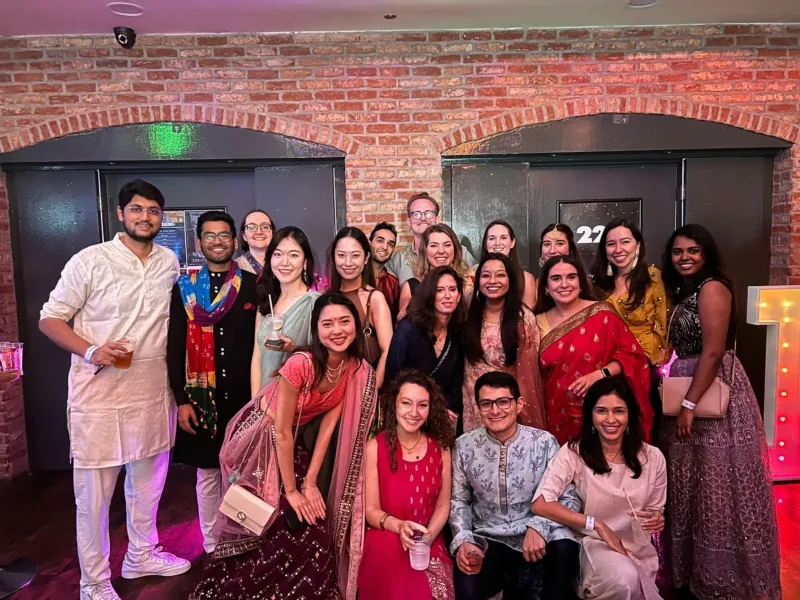
Diwali Ball, 2023
As I reflect on how much I have accomplished, I would like to share the following advice with other FLII students who are navigating environments where others seem more privileged:
1) Seek Help and Don’t Be Afraid: FLII students often feel like lone warriors who are used to handling everything alone. It’s easy to forget that people are generally kind and willing to help if they’re aware of your struggles. In my early days, I hesitated to ask for help, but at London Business School, I’ve become more comfortable reaching out. From time management to academics to career guidance, I found solace in seeking advice from my classmates and second-years. On campus, students can also find support from Student Wellbeing Services, Financial Aid Office, and the Career Centre. Bottom line: Don’t be afraid to seek assistance—most people face the “problem of unknown unknowns” – just like you.
2) Find a Mentor, Not Just a Guide: Look for people who care about your long-term growth, not just immediate tasks. Mentors can offer guidance, help you avoid pitfalls, and connect you with others who can support your journey.
3) Celebrate Your Wins: Your achievements may seem small to others, but they’re huge for you. CELEBRATE THEM! Whether it’s running your first 5K or attending your first networking event, these moments are worth recognizing.
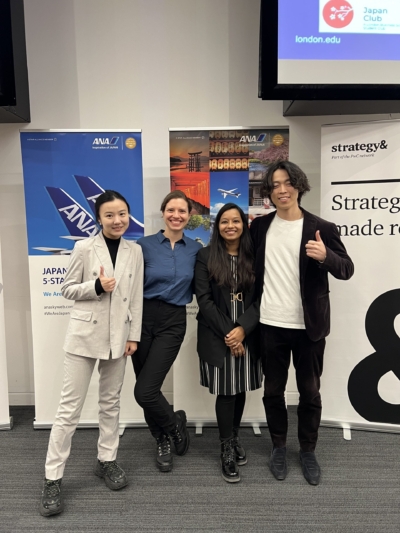
Finalists of ANA Japan Marketing Competition, November 2023
4) Build a Diverse Network: Surround yourself with people who understand your struggles, but don’t limit yourself to only those from similar backgrounds. Networking can be expensive, especially when it involves multiple social events, but prioritize those where the return on investment is high. Smaller, more intimate gatherings often provide better opportunities for meaningful connections.
I made some of my closest friends on campus at LATAM parties, Japanese Sake Night, and Korean Dinner Night. These events allowed me to appreciate the cultural heritage of each region and connect with students on a more personal level. One such friend is Nicole Narcizo (LBS ’25), with whom I participated in various competitions, including the Strategy& Case Competition and the ANA Japanese Marketing Competition. I experienced a particular moment of pride when I saw our team featured in the world’s largest financial newspaper, The Nikkei, in December 2023 for our participation in the marketing competition.
5) Learn to Manage FOMO: The Fear of Missing Out (FOMO) is real, especially on campus, where events, parties, and get-to-gathers happen frequently. Be mindful of what you can and can’t afford—financially and emotionally. Opt for lower-cost events like Bring Your Own Booze (BYOBs) or free activities to stay engaged without overextending yourself.
6) Never Stop Learning: Stay curious and actively seek out opportunities to grow. Whether through clubs, events, or coffee chats, continuously expand your knowledge and skills. I remember meeting students from different programs when I volunteered for the cleanliness drive at Regent’s Park organized by LBS students.
Being a First-Generation, Low-and-Intermediate-Income student comes with unique challenges, but it also offers opportunities to rise above them. For you, being FLII might be a weakness. To others, you bring in a new perspective which is raw and not biased by the luxuries of life. Be curious, challenge yourself, and uplift those around you. Through perseverance, support, and an unwavering commitment to growth, you can break through barriers and create your sense of belonging—wherever you go.
Divya is an MBA 2025 at London Business School. She is an accomplished data analytics professional with 8+ years of work experience, including 4 years at Google. She is one of the first people in her city and the first person in her family to pursue an education abroad. She strongly believes in equity and advocates for DEI at college and work. To know more, check her LinkedIn profile here.

